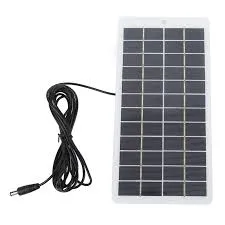solar panel efficiency average
Understanding Solar Panel Efficiency A Comprehensive Overview
The significance of solar energy in today's world cannot be overstated. With an increasing emphasis on renewable energy sources as a solution to combat climate change and reduce dependency on fossil fuels, solar panels have emerged as a pivotal technology. However, the efficiency of these solar panels is a critical factor that influences their adoption and effectiveness. This article aims to delve into the average efficiency of solar panels and its implications for energy production.
What is Solar Panel Efficiency?
Solar panel efficiency refers to the proportion of sunlight that a solar panel can convert into usable electricity. This efficiency is typically expressed as a percentage. For instance, if a solar panel converts 20% of the sunlight it receives into electricity, it has a 20% efficiency rating. The higher the efficiency, the more energy the panel can produce from the same amount of sunlight, which is particularly important in areas with limited space for solar installations.
Average Efficiency of Solar Panels
As of 2023, the average efficiency of commercially available solar panels ranges from 15% to 22%. Standard panels, often made from monocrystalline or polycrystalline silicon, usually fall within this range. Monocrystalline panels, known for their high efficiency and sleek appearance, tend to perform better, often exceeding 20% efficiency. In contrast, polycrystalline panels are generally slightly less efficient, with averages around 15% to 17%.
However, advancements in solar technology continually push the boundaries of efficiency. Bifacial solar panels, which can capture sunlight from both sides, and thin-film solar panels are two emerging options that help improve overall energy production. Bifacial panels can sometimes achieve efficiencies of over 25% under optimal conditions, making them an attractive choice for large-scale solar installations.
Factors Influencing Solar Panel Efficiency
Several factors influence the efficiency of solar panels, including
solar panel efficiency average

1. Material Quality The type of material used in the solar cells significantly impacts efficiency. Monocrystalline silicon cells tend to be the most efficient, while cadmium telluride (CdTe) and amorphous silicon are examples of materials with lower efficiencies.
2. Temperature Solar panels perform best at lower temperatures. High ambient temperatures can reduce a panel’s efficiency, highlighting the importance of proper placement and ventilation.
3. Light Intensity The amount and quality of light that hits the solar panels also play a crucial role. Shading from trees or buildings can severely limit energy production, emphasizing the need for careful site selection.
4. Installation Angle The angle and orientation of solar panels can affect how effectively they capture sunlight throughout the day. Adjusting the tilt to accommodate seasonal changes can optimize energy output.
The Future of Solar Panel Efficiency
As technology progresses, the future looks promising for solar panel efficiency. Researchers are exploring new materials, such as perovskite solar cells, which have shown the potential for remarkably high efficiencies in lab settings. These cells could revolutionize solar energy by providing more power in less space.
Moreover, innovations like solar tracking systems, which adjust the angle of panels to follow the sun, can increase efficiency by up to 25%. This integration of technology with solar energy aims not only to improve efficiency but also to make solar energy more affordable and accessible to a broader range of consumers.
Conclusion
In conclusion, while the average efficiency of solar panels currently ranges between 15% and 22%, continuous advancements in technology are paving the way for higher efficiencies and better energy yields. Understanding solar panel efficiency is crucial for both consumers and manufacturers as it directly impacts the viability and effectiveness of solar energy as a renewable resource. As the world shifts toward greener energy solutions, enhanced solar panel efficiency will play a vital role in achieving a sustainable future.
-
Understanding the Advantages of Solar String Inverters for Your Energy SystemNewsApr.29,2025
-
Choosing the Right PV Inverter: A Comprehensive GuideNewsApr.29,2025
-
The Future of Solar Power: Exploring Bifacial Solar PanelsNewsApr.29,2025
-
The Complete Guide to Solar Panels: Efficiency, Cost, And InstallationNewsApr.29,2025
-
The Best Options for Efficiency and Cost-EffectivenessNewsApr.29,2025
-
Harnessing the Power of Off-Grid Solar Inverters for Energy IndependenceNewsApr.29,2025







